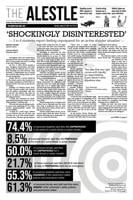The Illinois State Board of Education has introduced new culturally responsive teaching and leading strategies and standards to help teachers enrich all students’ learning experiences.
Cultural responsiveness in the case of these standards is to teach and lead with culture in mind, being open to different cultures that aren’t your own.
These standards are for teacher preparation so they can better understand cultural responsiveness when it comes to the classroom, creating an environment that is less Eurocentric and more open to all cultures.
Jennifer Kirmes, executive director of teaching and leading at the Illinois State Board of Education, said these standards have been worked on for a long time.
“This project has actually been ongoing since 2018,” Kirmes said. “At that time, Illinois was asked along with I think eight other states to be part of something called the [Diverse and Learner-Ready Teachers Initiative].”
Jennifer Hernandez, assistant professor in the Department of Teaching and Learning said these standards are important.
“It’s a way to ensure that every student has a high quality education experience and they have access to appropriate education,” Hernandez said.
According to Hernandez, students were given the right to quality education from the Declaration of Independence.
“The general welfare clause in the Declaration of Independence is the idea that everyone is entitled to a free and appropriate public education,” Hernandez said. “We can’t say that children of color are receiving that because the education they’re receiving is very Eurocentric and white supremacist.”
Joshua Kaufmann, the senior executive director of Teach Plus Illinois said the standards provide a mirror and window type strategy. They can look at themselves but also see experiences of other people as well.
“You take people's identities and backgrounds into account as you are designing or delivering your instructions … all education should provide students mirrors and windows,” Kaufmann said. “They should be able to see some of their own experiences with what they are doing, but education should also provide windows for people to get a chance to understand the world beyond their previous lived experiences.”
Kirmes said the adoption of these standards is not the end of their work. She said the Board of Education will continue working closely with the program to improve students’ schooling experiences.
“The state board is really happy that we’ve gotten to this place and we have adopted standards for the state,” Kirmes said. “We also recognize that this is in no way the end of the journey.”












(0) comments
Welcome to the discussion.
Log In
Keep it Clean. Please avoid obscene, vulgar, lewd, racist or sexually-oriented language.
PLEASE TURN OFF YOUR CAPS LOCK.
Don't Threaten. Threats of harming another person will not be tolerated.
Be Truthful. Don't knowingly lie about anyone or anything.
Be Nice. No racism, sexism or any sort of -ism that is degrading to another person.
Be Proactive. Use the 'Report' link on each comment to let us know of abusive posts.
Share with Us. We'd love to hear eyewitness accounts, the history behind an article.